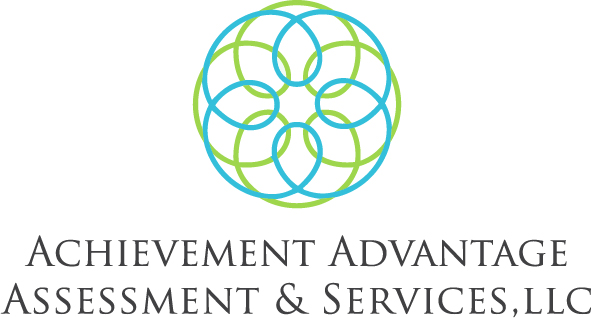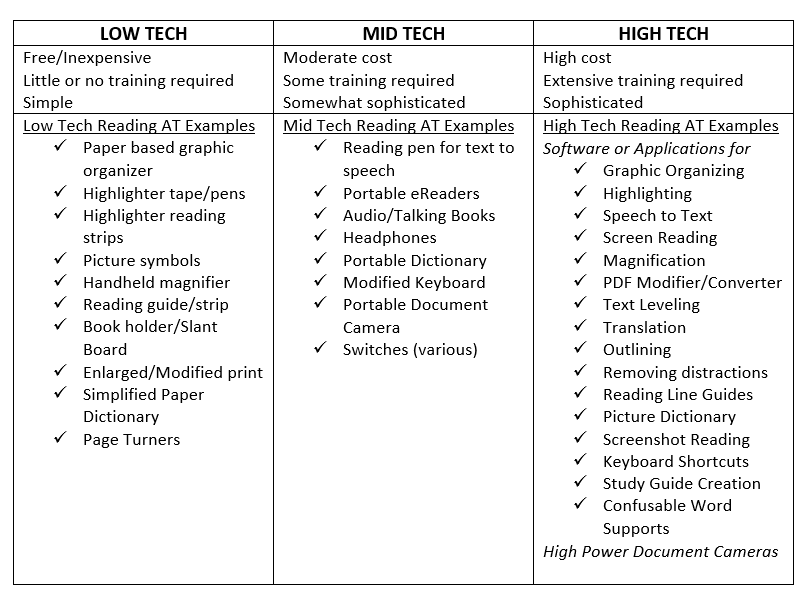This week, we are welcoming a guest blog to our reading series. The team at LeafBridge of United Cerebral Palsy of Greater Cleveland are sharing information about low, mid, and high tech assistive technology resources that can help address your students’ reading needs.
Assistive Technology
An assistive technology (AT) device includes any item, piece of equipment, or product system used to increase, maintain, or improve the functional capabilities of a child with a disability. AT devices should promote access to the curriculum and student achievement. AT services are necessary to assess, select, and instruct in use of the most appropriate AT. Part 1 of this blog series (Assistive Technology: Review IEPs Prior to Back-To-School) includes general information about AT. In Part 2, the LeafBridge team reviews some possible “Low Tech”, “Mid Tech,” and “High Tech” AT solutions for reading.
Remember that individualized assessment (AT service) precedes choosing an AT device or tool. The following lists include EXAMPLES of AT for reading. The intent is to demonstrate a small snapshot of the MANY available options for reading AT. There are many other fine AT devices and tools available in addition to those identified in this blog. We intentionally placed the “cart before the horse” in this blog to help readers understand the importance of assessment to identify the most appropriate AT option for a student, rather than arbitrarily choosing from lists of AT. Please stay tuned to AT Blog Part 3 to review the assessment process for AT. The following products, manufacturers or vendors are meant only as examples. United Cerebral Palsy and LeafBridge Services do not endorse specific products and they do not have affiliations with the products, websites, or resources. Please note that vendors listed may not be the sole supplier for a product.
Low Tech Reading Assistive Technology
Resources for Printable Graphic Organizers for Reading
https://www.teacherprintables.net/free-printable-organizers.html
https://www.dailyteachingtools.com/free-graphic-organizers.html
Highlighters
Sentence Reading Guides
E.Z.C. Reader Strips: https://www.reallygoodstuff.com/ezc-reader-strips/p/143538BL/
Ashley Productions: http://www.ashleyusa.com/store/Sentence-Strip-Reading-Guides-7-25-x1-25-c16157164
Paragraph Reading Guides
Ashley Productions: http://www.ashleyusa.com/store/Big-Reading-Guides-7-25-x3-75-c16157166
Page Reading Guides
Ashley Productions: http://www.ashleyusa.com/store/Full-Page-Reading-Guides-8-5-x11-c16157165
Book Holders
Review Article on Book Stands:
Links to various Book Stands:
Enlarged or Modified Print
Increase font size and spacing using standard simple font options
Mid and High Tech Reading Assistive Technology
Fonts:
Dyslexia Font: https://www.dyslexiefont.com/en/typeface/
Reading with Pictures
Widget: https://www.widgit.com/
Crick Software: https://www.cricksoft.com/uk/clicker
Picture It: https://www.attainmentcompany.com/picture-it-software
Symbol Stix: https://www.n2y.com/symbolstix-prime/
Boardmaker: https://goboardmaker.com/
Audio and Digital Books
Ohio Digital Library: https://ohdbks-mansfieldrichland.overdrive.com/library/kids
Ohio Library for the Blind and Physically Disabled: https://cpl.org/aboutthelibrary/ohio-library-for-the-blind-physically-disabled/
Software Programs and Apps with Multiple Reading Technology Features
Don Johnston Inc.: https://learningtools.donjohnston.com/product/
Read and Write Literacy Software by Texthelp: https://www.texthelp.com/en-us/products/read-write/
Kurzweil: https://www.kurzweiledu.com/default.html
Digital Recording Pen
C-Pen Reader: http://www.readerpen.com/
Wizcomtech Reading Pens: https://www.wizcomtech.com/
Cameras
IPEVO Document Cameras: https://medium.com/ipevo/tagged/document-camera
Hovercam Document Cameras: https://www.hovercam.com/document-cameras
About the Authors
Rebecca Guenther, M.A, CCC-SLP is a speech-language pathologist with 14 years of school based, home and outpatient experience with a primary focus on children with complex disorders including cerebral palsy, autism, and rare genetic conditions. Rebecca has a passion for developing and implementing functional communication systems using a combination of both low and high technology augmentative/alternative communication systems. Rebecca is a leader in her field and has provided hands on training and professional in-services to her peers regarding Augmentative/Alternative Communication. Rebecca remains current in this ever-changing assistive technology field by attending professional conferences such as the Assistive Technology Industry Association Conference and Closing the Gap. Rebecca is proficient in programming multiple AAC devices from frequently used vendors such as Saltillo, Prentke Romich Company, Tobii-Dynavox, Pragmatic Organization Dynamic Display communication books, and multiple tablet applications. Rebecca serves as the Speech and Language Pathology Manager for the pediatric department at LeafBridge of United Cerebral Palsy (UCP) of Greater Cleveland. As manager, she coordinates speech therapy programming, leads Camp LeafBridge for Extended School Year summer programming and she coordinates feeding therapy services provided at LeafBridge. Rebecca travels the state of Ohio to conduct Assistive Technology Evaluations and Independent Educational Evaluations.
Amanda Stohrer, MS, OTR/L, ATP is an Occupational Therapist with extensive experience in providing care for children with complex disabilities. Amanda serves as the Occupational Therapy Manager for the pediatric department at LeafBridge of United Cerebral Palsy (UCP) of Greater Cleveland. As manager, Amanda coordinates occupational therapy programming for school-based services, outpatient therapies, fieldwork experiences, a functional skills program, upper extremity serial casting, and the LeafBridge Steps to Independence program for intensive intervention. Amanda is a RESNA certified Assistive Technology Professional and is highly skilled with transdisciplinary assessment for seating and mobility in collaboration with the assistive technology team at LeafBridge. Amanda earned a BS in Interdisciplinary Health Sciences in 2008 and then a master’s degree in Occupational Therapy in 2009 through Western Michigan University. Amanda has significant training in sensory integration, NDT, functional electrical stimulation, orthopedics, interventions for children with complex learning needs, and Cortical Visual Impairment (CVI.) As an adjunct faculty member for the COTA program at Cuyahoga Community College, Amanda facilitates the lab and lecture series for the course entitled "Techniques in Developmental Disabilities.” Amanda holds the Perkins-Roman CVI Range© Endorsement which demonstrates expertise in administering the CVI Range Assessment for Children with Cortical Visual Impairment. In addition, she earned Micro credentials in CVI Basics and the CVI Range. Amanda travels the state of Ohio to conduct Assistive Technology and Independent Educational Evaluations.
Laurene Sweet, PT, ATP, MEd, DPT is a Doctor of Physical Therapy and RESNA certified Assistive Technology Professional with 25 years of experience in outpatient clinics, schools, hospitals, an autism specialty program, and the Day Program for alternative school placements at UCP. She is the Manager of Specialized Services for LeafBridge. Laurene’s expertise in developing holistic programming for children with complex and co-existing disabilities emerged through cross training with other disciplines, continuing education, and direct experience. In 2007, she earned a master’s degree in Special Education with concentrations in Autism and Assistive Technology and advanced coursework in Functional Behavior Assessment. In 2014, Laurene published peer-reviewed clinical research in the Pediatric Physical therapy Journal. She manages the serial casting program at UCP to improve range of motion for children with ankle and foot deformities. Laurene coordinates UCP’s Day Program for children with complex learning needs and Cortical Visual Impairment (CVI). She holds the Perkins-Roman CVI Range© Endorsement which demonstrates expertise in administering the CVI Range Assessment for Children with Cortical Visual Impairment. In addition, Laurene earned Micro credentials in CVI Basics and the CVI Range. Laurene is a mother of a student with a Specific Learning Disability. She adopted two teenagers from foster care and is well-versed in Trauma Informed Care. Laurene travels the state of Ohio to conduct Assistive Technology and Independent Educational Evaluations.


